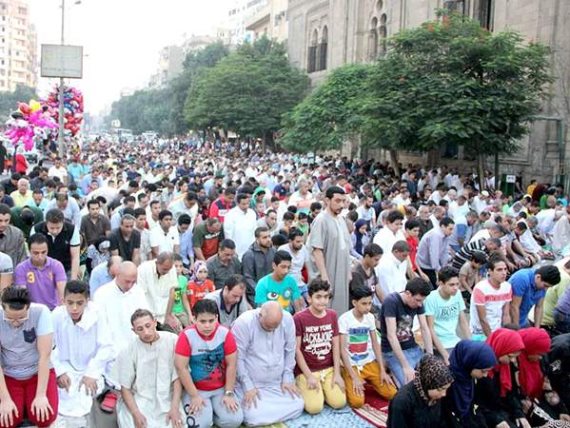Charitable giving is an important part of the Islamic holy month of Ramadan. Islamist groups, which have long used a combination of religion and social services to build support networks, have a natural advantage over secular groups in this domain. But in this year’s political climate, liberal, leftist and centrist groups also hope to use the holy month to recruit voters and spread their messages.
This difference has traditionally separated secular parties and the Muslim Brotherhood, says Shadi Hamid, research director at the Brookings Doha Center.
“A secular political party is just that, a party, while the Brotherhood is not just a movement, social service, or charity group – it is all those things and that gives them a natural advantage.”
Secular groups hope that they can erase this advantage ahead of the parliamentary elections slated for November.
Farid Zahran, a senior member of the Egyptian Social Democratic Party, says that his party's emphasis will be on family celebrations and festivities.
“For us, Ramadan is a month for prayer and religious observation, as well as celebration,” he says. “This is in contrast to strict Islamists, who discourage the celebratory aspect of Ramadan.”
The Social Democrat Party, which claims that with 35,000 members it is the largest in Egypt, will focus on festivities after iftar meals in various governorates.
The party also offers some social services, mainly in the form of one or two medical caravans it sends out every week to offer free treatment. Yet despite this effort, Zahran said the party prefers to keep its charity work separate from its political activities.
“We don’t really do charity work ourselves, but link up with non-governmental organizations (NGOs),” he says, adding that while he does not think it is smart for parties to take over the work of NGOs, they should still assist them. “The party’s activists are free to join NGOs separately,” he said.
Meanwhile, the centrist Adl Party has a well-developed a strategy for Ramadan. One of its initiatives is the Project of 30, which party officer Abdel Moneim Emam tells Al-Masry Al-Youm involves sending out 30 medical caravans, especially in Upper Egypt, conducting 30 medical operations, creating 30 employment opportunities for people in every governorate, and having 30 souqs that sell goods at wholesale prices.
The Adl Party has the advantage of being well-funded. It is backed by a number of businessmen, including Hisham al-Khazindar, the managing director and co-founder of Citadel Capital, a leading private equity firm in the Middle East and Africa.
Senior party member Mostafa al-Naggar is also a former member of the Muslim Brotherhood. Adl, which means “to act justly” in Arabic, describes itself as a centrist party positioned between liberal and Islamist groups.
Taking its cue from the Brotherhood, and its understanding of the importance of offering social services, the Adl Party has been offering medical caravans and discounted food markets even before Ramadan as a way of introducing itself to new constituents and recruiting members. The party has 10,000 members so far, according to Emam.
Youth activists from the Adl Party are also going to be busy this month learning about people's needs on the streets.
“We feel that after Tahrir Egyptians have been divided and that the normal Egyptian person feels nobody really cares about him – nobody is asking what he wants, what are his problems, and what does he need,” said Mohamed Emara, an Adl Party activist.
“For Ramadan, we’re going to the people, to crowded areas to listen to the people and find out what they think the solutions are,” Emara said. This, he added, will help the party develop its program and platform.
The party will host some cultural events and political education seminars, he says. “For the last 30 years we haven’t had any experience in democracy, so we’re going to try and educate people about it.”
The party has decided against giving out Ramadan food packages, because, Emara says, “We thought about it, and realized that maybe it’s time to feed people’s brains, and not just their stomachs.”
Also active this Ramadan is the Democratic Front of the April 6 Youth Movement, a splinter group from April 6 that claims 5,000 members.
“We have agreed that from 6 August we will go in the streets and coffee shops to reach out to people and educate them about what the revolution means, why it started, what it has achieved, and what it has yet to achieve,” Sharif Al-Rouby, a member of the Democratic Front's political office, told Al-Masry Al-Youm.
This strategy aligns with the army’s removal of protestors from Tahrir Square, and its suspension of a 23-day sit-in on 31 July by 26 political movements and parties until after Ramadan.
“We’re going out to contact people, because staying in Tahrir has made us lose our credibility,” Rouby added.
Rouby has printed 280,000 flyers and 300,000 Ramadan timetables that he plans to send to youth activists in Cairo, Alexandria and other governorates to tell people about what the party has done and what it still hopes to do.
It has also been developing its social service capacity. In June, the party went to the governorates of Fayoum, Suez and Ismailia with the non-profit Resala Charity Organization and real estate group Amar Ya Masr to help distribute food packages and educate people politically.
“When you go there with a goody-bag, people are willing to sit with you and listen for one or two hours,” Rouby says, critical of the way some have gotten used to being paid for their political support. He says votes have in the past been based on money, rather than party programs.
It isn’t just political parties and civil society groups who hope to take advantage of Ramadan to improve their images. The ruling Supreme Council of the Armed Forces, which took over the country in February, is also trying to use Ramadan to its advantage by distributing food packages. According to the Brookings Center’s Hamid, this is their way of saying “we’re part of Egyptian society and have something to offer.”




